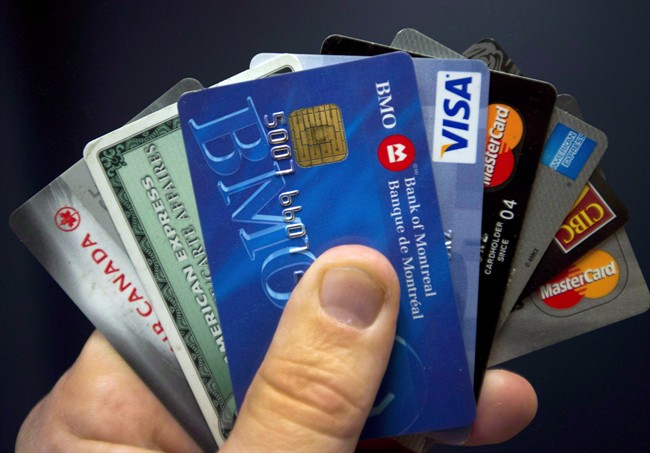Do you know what your credit rating is? So much rides on it: your ability to get a credit card, rent an apartment or buy a home. But how much do you really know about what goes into your credit score?

To try and demystify the elusive credit rating process, we spoke with the Paul Le Fevre, director of operations at Equifax Canada. The company processes tens of thousands of credit checks every day and has credit files on more than 24 million Canadians.
Le Fevre says he doesn’t know the “secret formula” of the credit scoring system, but he can reveal:
The five components that make up your credit score
1. Payment history: 35 per cent
“The biggest component in delivering a score is the payment history of that consumer,” Le Fevre explains. “So that includes: is everything paid on time? Has there been a late payment or periodic late payments?”
The payment rating “matrix” ranges from zero to nine, with zero being a brand new account. If you pay within 30 days of the due date, you get an “R1.” If you’re under 30 days late, that information may not reach Equifax.
You move down to an “R2,” though, if you’re between 30 to 60 days past due. At the 120 days-past due mark, you drop to an “R5.” You don’t ever want to reach that point. It continues downhill from there until you reach “R9” and the account is closed for non-payment.
What you may not know: cell phone information is also fair game.
“It takes that information, i.e. how you’re paying on your cellphone account into play, along with your credit card, your installment loan, your car lease, your line of credit and your mortgage. It all comes into play.”
2. Utilization: 30 per cent
“Another big thing is how close your balance is to your limit,” says Edmonton mortgage broker Natalie Wellings, who deals with people’s credit ratings on a daily basis.
“If you are close to your limit, your credit score drops. So whether your limit is $500 or $5,000, when you are close to your limit, it drops your score.”
3. History: 15 per cent
This one is simple: the longer you have an account (like a credit card or line of credit), and keep up the good behaviour — i.e. no late payments — the better your rating will be.
4. Credit product type: 10 per cent
Different types of credit carry different kinds of weight.
“You look at a mortgage,” Le Fevre explains, “every month, the amount owed will come down because of the payments being made.”
Whereas, you can quickly max out a credit card or rack up a massive cellphone bill on any given day. So there’s more risk involved, at least from a credit rating standpoint.
5. The “inquiry” section: 10 per cent
You may have heard that each time your credit is checked, your score drops a little lower. Well, that’s true, but not to the extent that you may think. When you’re shopping around for a mortgage, there’s the notion that going to a mortgage broker is better than several banks in part because the broker will only check your credit once and apply to multiple lenders.
According to Le Fevre, you don’t have to be afraid to shop around.
“When you’re applying for a car loan or a mortgage, the system recognizes that you may be…going to multiple locations.”
“Those inquiries are ‘de-duped’ — each one is posted individually, because we must under credit card reporting legislation. But they only count as one inquiry from a scoring perspective.”
How long will your credit mistakes haunt you?
Le Fevre says, typically, credit information stays on record for six years. But the more time passes following a “slip-up,” the less it’s held against you.
“So from a scoring perspective, if you have a collection on there that’s posted last month, that’s going to have far more of a negative impact than if that collection is four years old.”
How to improve your credit rating
If your credit rating is a little less than stellar, don’t panic. While unfortunately there are no easy quick fixes, there are a few simple things you can do to help turn things around.
- The best way to improve your score is to make all your payments on time — without exception, Le Fevre stresses.
- Keep paying down your debt.
- Try to keep your credit card balances below 50 per cent of your available credit, mortgage broker Natalie Wellings advises.
- Avoid applying for credit unless you really need it. “Too many inquiries in a short period of time can sometimes be interpreted as a sign that you are opening numerous credit accounts due to financial difficulties, or overextending yourself by taking on more debt than you can actually repay,” according to Equifax.
READ MORE: Why it’s important to check your credit history
If you feel like you’re in over your head, you can always consult a not-for-profit credit card counselling society, which can help consolidate your debt.
Declaring bankruptcy should be your last option. Le Fevre calls it “the most derogatory of events from a credit perspective.”
A good recommendation is also to sign up for regular free credit reports. Those can alert you to any suspicious activity on your account which would affect your credit. Keep in mind, if you want to see your credit score, that will cost you.




Comments